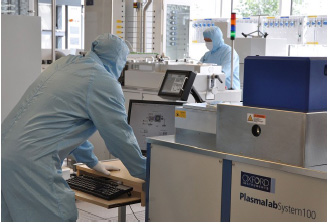Industry and Academia came together at the University of Southampton recently to demonstrate the success of an industrial collaboration which is creating the cutting-edge nanotechnology needed for smaller, low power devices.
The 'Knowledge Creation Partnership - From Funding to Results' workshop at the University of Southampton, attracted a high level of interest, with talks by University researchers in nanotechnology and industrialists from Oxford Instruments Plasma Technology. They described how the two organisations have partnered during a two year collaboration to develop nanotechnology tools. Combining the University's knowledge and research with Oxford Instruments' tools has already produced results, and these were presented by Prof Peter Ashburn from the University, Dr Mike Cooke, CTO at Oxford Instruments, and their colleagues.
 The University of Southampton Cleanroom (Image courtesy of University of Southampton).
The University of Southampton Cleanroom (Image courtesy of University of Southampton).
"We recognise the importance of partnerships between the commercial and the academic sectors, in today's highly competitive, fast moving and demanding global markets, and at Oxford Instruments we see businesses forming the bridge between science and the consumer." Comments Frazer Anderson, Oxford Instruments Plasma Technology's Business Development Director, "Through collaborations with some of the world's leading scientists and institutions, companies like ours turn smart science into commercially successful products."
Professor Peter Ashburn, of the University's Nano Research Group within ECS-Electronics and Computer Science is very positive about the collaboration, "Our University and Oxford Instruments have worked together to develop a range of processes for the company's tools which will be used to make nanoscale transistors. These new plasma-based technologies provide etching and deposition functions on nanoscale materials and are being used in the Southampton Nanofabrication Centre, one of Europe's leading multidisciplinary state-of-the-art cleanroom complexes."
Oxford Instruments Plasma Technology is involved in equally successful collaborations at the Molecular Foundry, LBNL, USA, and with ITRI, Taiwan, each focussing on key areas of scientific research and development, which ultimately lead to development of tools for use in wider markets of research and production.